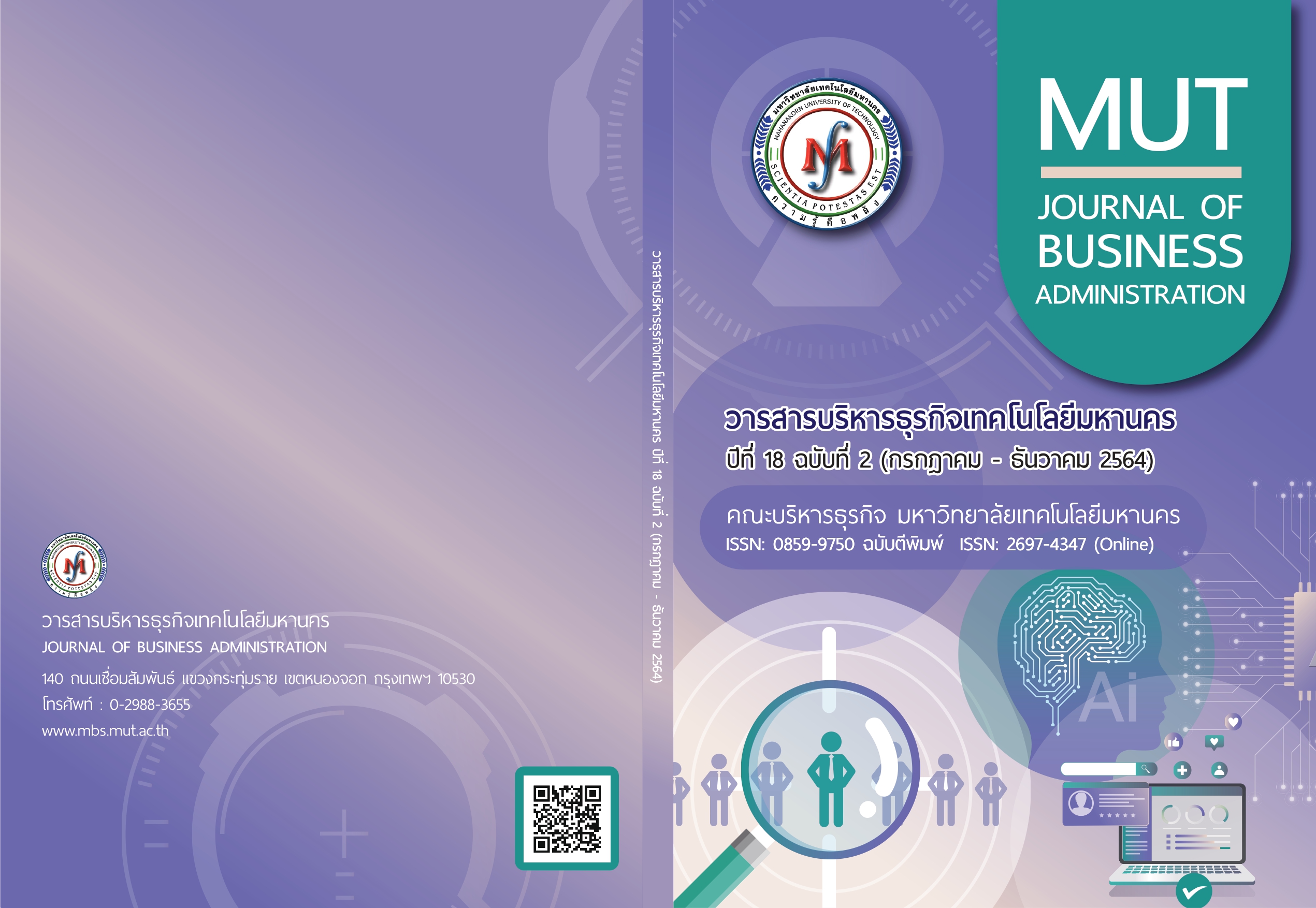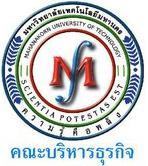Talent Management of the Western Culture MNCs in Thailand: A Grounded Theory Study
Keywords:
Western Culture MNCs, Talent management, Talent, A Grounded TheoryAbstract
This research was conducted to study 1) the meaning of talent and talent management; 2) the process and practice of talent management; and 3) the measurement of the outcomes of talent management. This research was a qualitative research, grounded theory study. The multinational corporations and key informants were selected using the theoretical sampling. The data were obtained from in-depth interviews with 3 organizations and 6 key informants. The results showed that 1) the meaning of talent was divided into people perspective and business perspective. Also, the meaning of talent management was a systematic perspective on creating future leaders by engaging in talent management systems. 2) The process and practice of talent management included discovering, attracting, developing and retaining talents. 3) Measuring the outcomes of talent management included impact measurement, reaction measurement and implementation measurement. This study suggested that the meaning of talent was a guideline for developing the construction of talent indicators and building talent management system to suit contextual factors.
References
ปีที่ 39 ฉบับที่ 152.1 – 26.
ยุวดี จันทะศิริ. 2563. รูปแบบความสัมพันธ์เชิงสาเหตุคุณลักษณะคนคุณภาพ และการนำคนคุณภาพไปใช้ประโยชน์ที่มีต่อความยึดมั่นผูกพัน และผลการปฎิบัติงานของพนักงานในอุตสาหกรรมอาหารทละแปรรูปภาคใต้: การวิจัยผสานวิธี. วิทยานิพนธ์ปรัชญาดุษฎีบัณฑิต (การวิจัยพฤติกรรมศาสตร์ประยุกต์). มหาวิทยาลัยศรีนครินทรวิโรฒ.
วิจัยกรุงศรี. 2564. แนวโน้มธุรกิจและอุตสาหกรรมไทยปี 2564-2566. สืบค้นวันที่ 30 กรกฎาคม 2564 จาก https://www.krungsri.com/th/research/industry/industry-outlook/Construction-Construction-Materials/Construction-Materials/IO/io-construction-materials-21
Adamsen, B. 2014. Do We Really Know What the Term “Talent” in Talent Management Means? — And What Could Be the Consequences of Not Knowing? Philosophy of Management. Vol.13. 3 – 20.
Aditya Birla Group. 2015. Talent management. Retrieved December 30, 2020 from http:// http://www.adityabirla.com/thai/About-Us/vision-and-values
Armstrong, M. 2006. Human Resource Management Practice. London: Great Britain.
Barlow, L. 2006. Talent development: the new imperative?. Development and Learning in Organization. Vol. 20. No. 30. 6 – 9.
Cappelli, P. 2008. Talent Management for the Twenty-First Century. Harvard Business Review. Vol. 86. No. 3. 74 – 81.
Charmz, K. 2014. Constructing Grounded Theory. 2nd ed. London: SAGE.
Collings, D. G., and Mellahi, K. 2009. Strategic talent management: A review and research
agenda. Human Resource Management Review. Vol. 19. No. 4. 304 – 313.
Farndate, E., Scullion, H., and Sparrow, P. 2010. The role of the corporate HR function in global talent- management. Journal of World Business. Vol. 45. No. 2. 161 – 168.
Gallardo-Gallardo, E., Thunnissen, M., and Scullion, H. 2019. Talent management: context matters, The International Journal of Human Resource Management. Vol.31. No. 4. 457 – 473.
Gallardo-Gallardo, E., Dries, N., and Gonzalez-Cruz, T. F. 2013. What is the meaning of ‘talent’ in the world of work?. Human Resource Management Review. Vol. 23. No. 1. 290 – 300.
Glaser, B., and Strauss, A. 1967. The Discovery of Grounded Theory: Strategies for Qualitative Research. California: Sociology Press.
Guthridge, M., Komm, A. B., and Lawson, E. 2008. Making talent a strategic priority. Retrieved May 25, 2012 from http://www.leadway.org/PDF/Making%20talent%20a%20strategic%20priority.pdf
Lepak, D. P., and Snell, S., A. 2002. Examining the Human Resource Architecture: The Relationships Among Human Capital, Employment, and Human Resource Configurations. Journal of Management. Vol. 28. 517 – 543.
Lewis, R. E., and Heckman, R. J. 2006. Talent Management: A critical review. Human Resource Management Review. Vol. 16. No. 2. 139 – 154.
Llopis, G. 2015. PepsiCo Adding Breadth to Talent Depth with Critical Experiences. Retrieved December 30, 2020 from https://www.forbes.com/sites/glennllopis/2015/02/23/pepsico-adding-breadth-to-talent-depth-with-critical-experiences/?sh=5ad344846f15
Minbaeva, D., and Collings, D. G. 2013. Seven myth of global talent management. The International Journal of Human Resource Management. Vol. 24. No. 9. 1762–1776.
Miner, J. B. 1973. Management consulting firm as a source of high-level managerial
talent. Academy of Management Journal. Vol.16. No. 2. 253 – 264.
NHS Leadership Academy Talent and Talent Management Insights. 2014. Talent and Talent
Management Insights. Retrieved January, 2015 from https://www.leadershipacademy.nhs.uk/wp-content/uploads/2014/07/Insight-1-Defining-Talent-and-Talent-Management.pdf
Noelle, K. Newhouse, Barbara, O. Lewis, and John, W. Jones. 2004. Strategic Talent Management: Assessment As a Foundation Next Generation Strategies In The Ongoing Talent War. Retrieved December 30, 2020 from http:// www.ipat.com/SiteCollectionDocuments/pdfs/wp-stm.pdf.
Savarimuthu, A., and Jothi, A., Davana. 2018. Talent Management: A Conceptual Framework. International Journal of Research in Engineering, IT and Social Sciences. Vol. 8. No. 11. 71 – 78.
Scott, B., and Revis, S. 2008. Talent management in hospitality: graduate career success and strategies. International Journal of Contemporary Hospitality. Vol. 20. No. 7. 781 – 791.
Stahl, G. K., Bjorkman, I., Farndale, E., Morris, S. S., Paauwe, J., Stiles, P., Trevor, J., and Wright, P. 2012. Six principles of effective global talent management. MIT Sloan Management Review. Vol. 53. No. 2. 25 – 42.
Stake, R. E., 1988. Case Study Methods Education Research: Seeking Sweet Water. In Complementary Method for Research Education. Washington: American Educational Research Association.
Tansley, C., Turner, P., Carley, F., Harris, L., Sempik, A., Stewart, J., and Williams, H. 2007. Talent: Strategy, management, measurement. London: Chartered Institute of Personnel and Development (CIPD).
Tasley, C. 2011. What do we mean by the term “talent’’ in talent management?. Industrial and commercial training. Vol. 43. No. 5. 266 – 274.
Tedgui, L. 2021. Talent management: everything you need to know in 2021. Retrieved May 20, 2020 from https://moovone.eu/en/talent-management/talent-management-
Thunnissena, M., Boselieb, P., and Fruytier, B. 2013. A review of talent management: ‘in-
fancy or adolescence?’ The International Journal of Human Resource Management. Vol. 24. No. 9. 1744 – 1761.
Uren, L. 2007. From talent compliance to talent commitment: Moving beyond the hype of talent management to realizing the benefits. Strategy HR Review. Vol. 6. No. 3. 33 – 35.
Vaiman, V., Scullion, H., and Collings, D.G. 2012 Talent Management Decision Making. Management Decision. Vol. 50. No. 5. 925 – 41.
Waheed, S., Zaim, A., and Zaim, H. 2012. Talent Management in Four Stages. The USV Annals of Economics and Public Administration. Vol.12. No. 1. 130 – 137.
Additional Files
Published
Issue
Section
License
ข้อความ ข้อคิดเห็น ข้อมูล เนื้อหา รูปภาพ แผนภูมิ แผนผัง เป็นต้น ที่ปรากฏและแสดงในบทความต่างๆ ในวารสารบริหารธุรกิจเทคโนโลยีมหานคร ถือเป็นความรับผิดชอบโดยตรงของผู้เขียนบทความนั้นๆ มิใช่เป็นความรับผิดชอบใดๆ ของวารสารบริหารธุรกิจเทคโนโลยีมหานคร และมหาวิทยาลัยเทคโนโลยีมหานคร
บทความที่ตีพิมพ์ในวารสารบริหารธุรกิจเทคโนโลยีมหานคร ถือเป็นลิขสิทธิ์เฉพาะของคณะบริหารธุรกิจ มหาวิทยาลัยเทคโนโลยีมหานคร หากบุคคลหรือหน่วยงานใดต้องการนำทั้งหมดหรือส่วนใดส่วนหนึ่งไปเผยแพร่ต่อหรือเพื่อกระทำการใดๆ จะต้องได้รับการอนุญาตเป็นลายลักษณ์อักษรจากคณะบริหารธุรกิจ มหาวิทยาลัยเทคโนโลยีมหานครก่อนเท่านั้น


